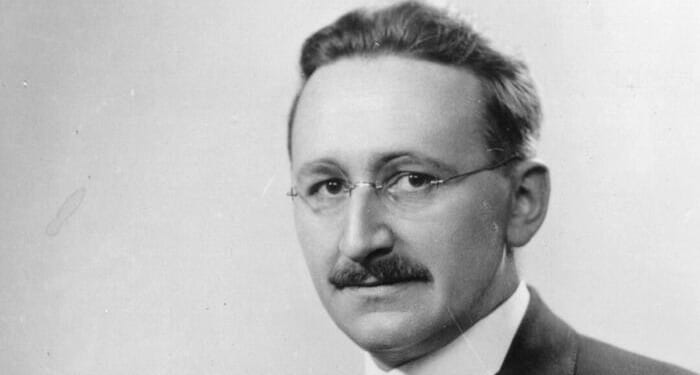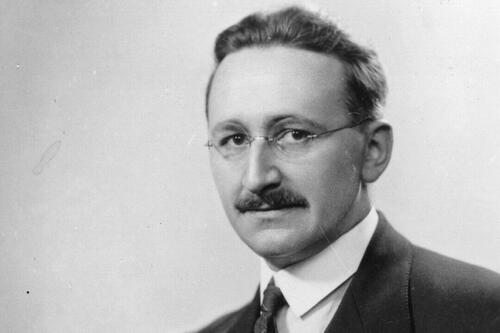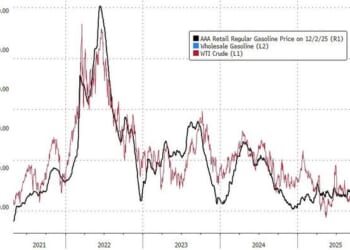Authored by Jeffrey A. Tucker via The Epoch Times (emphasis ours),
Some of the greatest political literature of the 20th century was written during years of violence, war, and upheaval between 1934 to 1946. During such times, the world of ideas leaves the parlor games and comes to affect the fate of millions. These are moments that divide the serious scholars from the pretenders.
During a crisis, from a career point of view, it is always better to stay silent. To speak out risks everything. It requires more than courage. It requires a willingness to put it all on the line to see one’s ideas realized in the real world. It’s also when intellectuals can have their greatest impact on the world. And yet, few do it. Few stand up when they are most needed.
One of my favorite thinkers from this entire period is F.A. Hayek, a monetary economist at the University of Vienna who left (as many did) to take residence in London at the London School of Economics. There he quickly established himself as the alternative to John Maynard Keynes, whose new theories contradicted the whole of classical economics.
Keynes was riding high as the guru of fascistic experiments the world over, even to the point of writing an introduction to the German edition of his book in 1936 when the Nazis were firmly in power. He celebrated the regime and its potential.
In contrast, Hayek represented old-world liberalism. Before his move to London, Hayek had been hard at work on theoretical problems involving capital structures, interest rate signaling issues, pricing as an information tool, the unworkability of socialism, and other such matters. His work in this area ultimately won him the Nobel Prize in 1974.
In the midst of the Second World War, Hayek was alarmed to see England take the direction of economic central planning, different in degree but not in kind to what was happening in Europe and the United States. The new system that had emerged from the Great Depression combined government and the largest corporate sectors into a single unit managed from the top.
His core critique was that no planners could possess the knowledge necessary to make these systems work in any way that would benefit the whole. The answer to social problems was not to assign the job of planning to intellectuals with resources and power, as was being done all over the world. Their plans would necessarily override the planning of individuals and families.
This drew him into facing matters concerning knowledge problems more generally. In a healthy, functioning, and prosperous society, where does the knowledge of resources, risk patterns, technologies, and awareness of changing conditions reside? Not with statesmen and bureaucrats, he said, but with individuals and communities—drawing from the well of human experience—who are more aware of the unique conditions of time and place.
Until this time, Hayek was mostly known to academic researchers and economists. But in 1944, he came out with a book that became a bestseller all over the world. The title was “The Road to Serfdom.” It was widely distributed in the United States too, thanks to a shortened version that appeared in Reader’s Digest.
Every book has an elevator pitch. The one that accompanied Hayek’s book went like this. If the Western capitalist states keep creating welfare states and expanding them, they will mutate into a kind of socialism that will wreck political democracy and freedom more generally.
Despite this summary, this is not really what the book said, however. Its critique was far more sophisticated. What’s odd about the reputation of the book is how it even contradicts the text. Hayek himself said that a limited and universal welfare provision for society can mitigate against revolutionary impulses and stabilize society.
I don’t happen to agree with that view but it is a point worth discussing.
His real point, if we really want an elevator pitch, is that attacks on economic freedom necessarily and always eat away at political freedoms and civil liberty generally. They might be well-intentioned and the people running the planning systems might be the best and the brightest. By overriding market signaling systems and trampling on property titles, they necessarily elevate some to rule over others. Serfdom might not be the plan but it can be the result.
The book spends considerable time examining the relationship between freedom and the information streams necessary for social evolution. The best knowledge is that which is born of experience from a problem itself. Who knows more about agriculture, the World Health Organization or a farmer? Who is going to design the best building to withstand coastal weather in the Southern United States, a Harvard professor or a local builder?
You get the point Hayek was making. But as he indicated, it seemed at the time that all governments in the world had fallen sway to the view that hyper-intelligent and credentialed experts could always structure a social and economic system better than anyone on the ground. This was his target.
The book is brilliant in many ways but there is one chapter that truly gives me the shivers. It’s on the subject of truth: specifically he warns of the end of truth. He writes that every totalitarian system has to seize control of the public mind. Because it has been made available for the first time online, we should reflect on it.
“To make a totalitarian system function efficiently,” writes Hayek, “it is not enough that everybody should be forced to work for the same ends. It is essential that the people should come to regard them as their own ends.”
This requires several steps. There needs to be an ideology; that is, a manufactured system of belief that defines a new heaven, a possible hell, and a means of reaching one and avoiding the other. There needs to be propaganda surrounding that ideology, pushed out through every possible venue. And there needs to be censorship of competing views.
All three of these are necessary for a consistent totalitarianism that seeks to manage the public mind. Hayek writes that all such attempts necessarily attack truth and morals: “They are destructive of all morals because they undermine one of the foundations of all morals: the sense of and the respect for truth.”
Indeed, the totalitarian system must replace all old or competing truths with one truth as defined by the party in power according to its own ends.
“The word ‘truth’ itself ceases to have its old meaning. It describes no longer something to be found, with the individual conscience as the sole arbiter of whether in any particular instance the evidence (or the standing of those proclaiming it) warrants a belief; it becomes something to be laid down by authority, something which has to be believed in the interest of the unity of the organized effort and which may have to be altered as the exigencies of this organized effort require it.”
He concludes with an observation that any collectivist system “ends by destroying reason because it misconceives the process on which the growth of reason depends.” That is because reason itself is only possible through an individual mind, a single person who is in a position to make an assessment. Turning that over to an agency, a media source, or a government disables the capacity for reason and truth to emerge from the free evolution of voluntary interaction and thought.
Keep in mind that Hayek was writing during a high degree of censorship in all nations. His target was not only the Nazi system and the Soviet system but emergent problems in the UK and the United States. This was his warning: This way put us on the road to serfdom.
As I read Hayek’s fiery chapter, I kept thinking of examples in our own times. There are many that are more obvious now than they would have been even a few years ago.
How many times have you heard that believing in man-made climate change, fixable with deindustrialization, is the one truth and that anyone who doubts it is a crazy and confused dissident? I heard that just this morning on the radio.
There are many such postulates around today, points that you are supposed to believe even though you might have doubts about the evidence. Public health is a good example. The wars over vaccines are no longer about health; they are about compliance and shame for those who have doubts.
The threat of totalitarianism never entirely goes away. We see it in many countries around the world today and sense the threat at home too. Certainly we lived through something close to it in the worst days of the pandemic response.
A mark of the danger always comes with the demand that you must believe such and such in order to be a good citizen and a contributor to the grand project. Hayek’s three elements—ideology, propaganda, and censorship—are the signs that someone is attempting to curate the public mind for totalitarian purposes.
A total state tolerates no dissent. So long as we are free to disagree—and a free people necessarily must exercise that freedom—we have not yet descended into totalitarianism. When it finally does arrive—and we’ve come close—it is too late to stop it.
Hayek was of a generation of rare intellectuals who knew for certain that the battle of ideas is not a mere parlor game. He stood up against the powers that be and made a huge difference, at great personal cost. So must we all.
Loading recommendations…


















